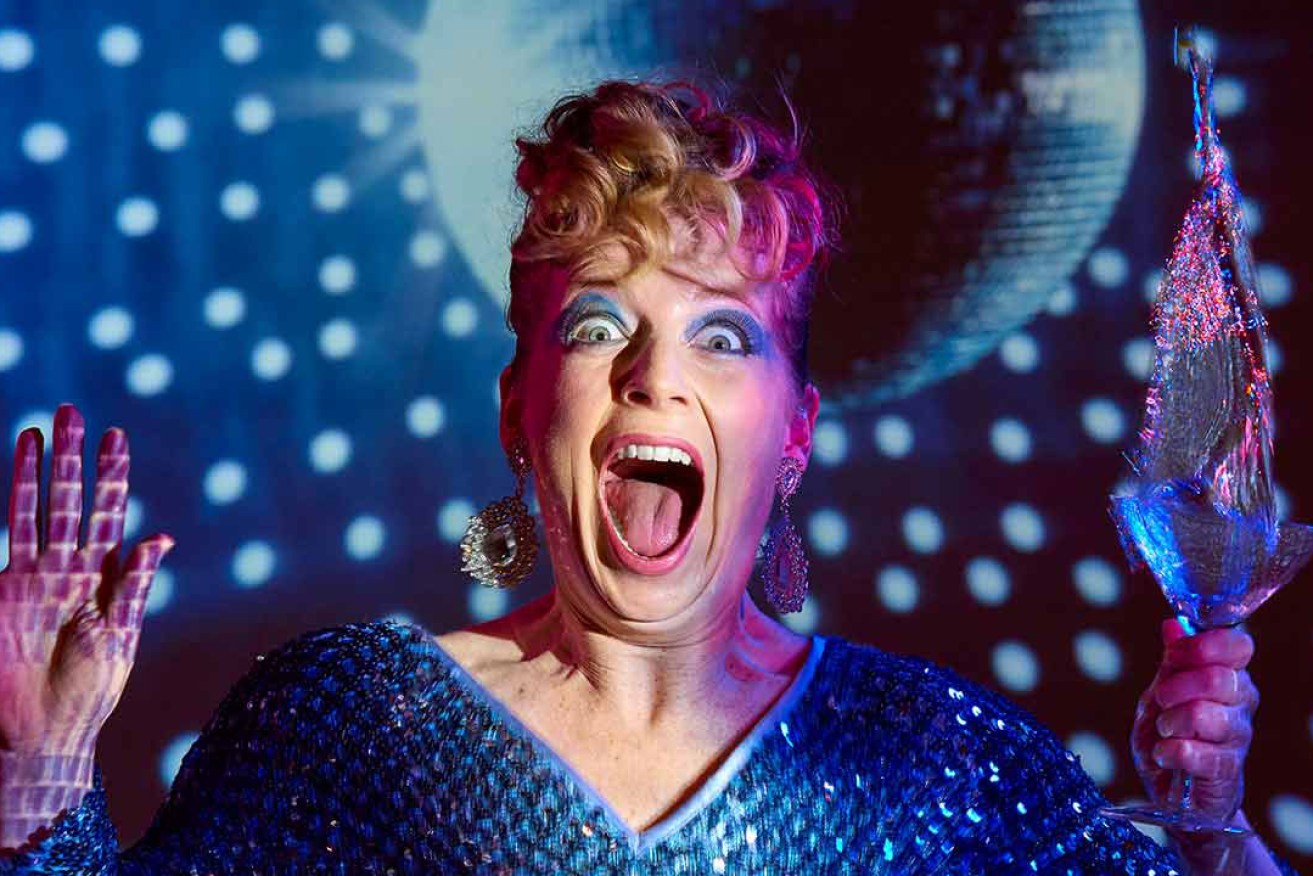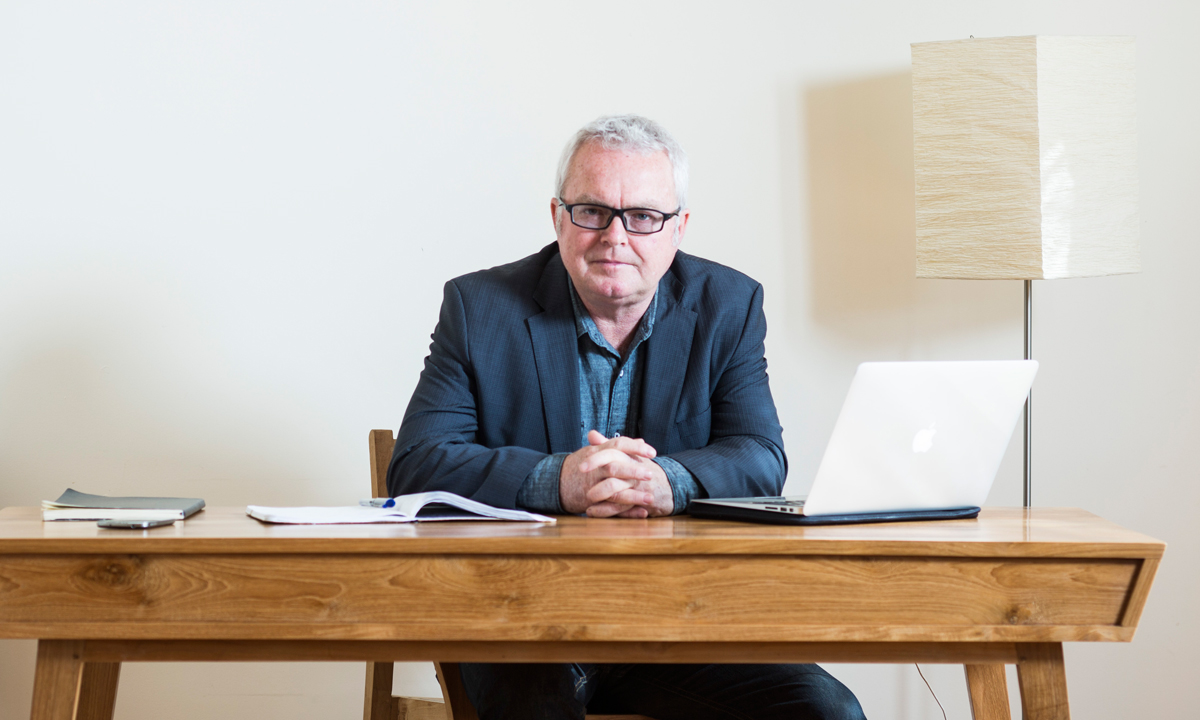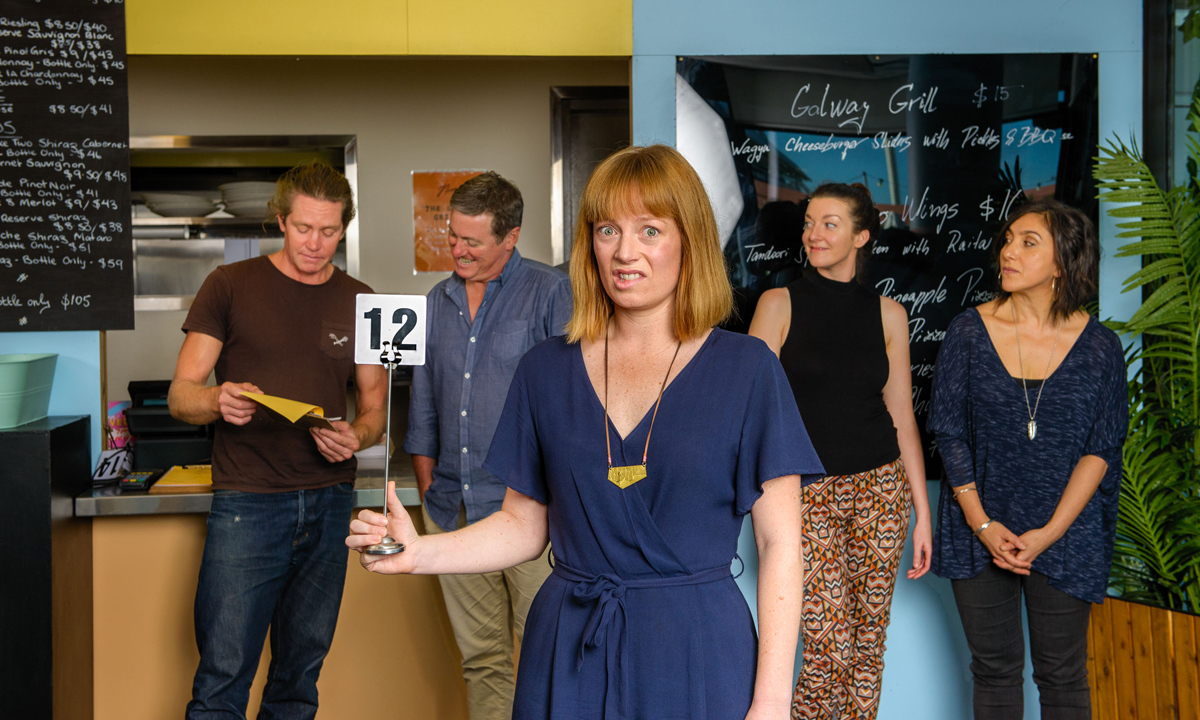After Dinner: I still blush at just how far I went
South Australian writer Andrew Bovell’s first play is described as “fall-off-your-chair funny” and is so sexually graphic it still makes him blush. Yet it was actually written in response to a tragic loss.

Partying like it's 1989: Jude Henshall in After Dinner. Photo: James Hartley
“It’s the late 1980s – it’s pre-Tinder, it’s pre-Grindr,” Bovell says of the setting for After Dinner, which is being presented this month by the State Theatre Company on the 30th anniversary of its first production.
“We used to go out to meet people, so it’s about that Friday night ritual of office workers going out to have a drink at the pub to hopefully meet somebody and make some kind of connection.”
The three female friends in After Dinner end up meeting two men at a table next to them in a pub bistro, setting the scene for what Bovell describes as a very funny social satire or comedy of errors “about looking for love and/or sex and getting it very wrong”.
Although the play delves into topics such as female sexual desire and male sexual dysfunction, Bovell was just a 20-year-old student at the Victorian College of the Arts when he wrote the first act.
A few years later, he finished the play and it was produced at Melbourne theatre La Mama.
“It was actually, strangely, a response to the murder of a friend in Thailand,” he says.
Ewa Czajor, a popular Australian theatre director who Bovell and his friends had worked with, was murdered in Thailand after stopping off there with her partner, Peter Murphy, while on her way to Poland to study theatre.
“It was a terrible shock to us all – the first big loss,” Bovell says.
“Peter was living in the flat opposite us, so I sat down and wrote this play to give him a job but also to find some sort of life-affirming response to this terrible thing that had happened … we kind of needed to laugh.”

Playwright Andrew Bovell. Photo: Randy Larcombe
All the five cast members in the first production of After Dinner, including Murphy and Bovell’s own partner (now wife) Eugenia Fragos, had worked with Czajor.
Although the play was scheduled for a two-week run, it ended up playing for 17 weeks in three different Melbourne theatres. After Dinner continued to enjoy the kind of success that was rare for an Australian work, being presented in nearly every capital city over the next five years and earning its writer a national profile.
“We kind of always thought Ewa was looking over us in some way,” Bovell says.
“It still surprises me that the play has lasted this long and that companies want to revisit it, but then when I see it, like when I saw in in 2015 [when it was revived by the Sydney Theatre Company], I think there is a lot of pleasure for an audience in the show.”
Since After Dinner, Bovell has won acclaim, and awards, for numerous works including Speaking in Tongues (adapted for the screen as Lantana), Who’s Afraid of the Working Class?, When the Rain Stops Falling and, most recently, Things I Know to Be True. He also adapted Kate Grenville’s The Secret River for stage.
State Theatre artistic director Geordie Brookman sees the revival of After Dinner as an ideal way to celebrate the man he describes as “one of our most-loved playwrights”.
“It’s fall-off-your-chair funny, fabulously inventive and utterly poignant in the way it talks about how and why we love,” Brookman says.

The After Dinner cast: Nathan Page, Rory Walker, Jude Henshall, Ellen Steele and Elena Carapetis. Photo: Chris Herzfeld
The State Theatre Company production is being directed by Corey McMahon with a cast comprising Nathan Page, Jude Henshall, Elena Carapetis, Rory Walker and Ellen Steele.
It promises a night of nostalgia for those who remember the ’80s, with a soundtrack of music including songs such as “Boys Light Up”, “Lady in Red” and “Total Control”, as well as a colourful set and costumes by Jonathon Oxlade.
However, Bovell believes the essential themes of the play still resonate today.
“You still hope to go out and meet somebody who you connect with and have a meaningful relationship with; that desire hasn’t changed, and that need for human connection and a good time with other people hasn’t changed.
“It’s very much about friendship, too – the friendship between three women and the dynamics, the good, bad and ugly.
“And it’s also about men trying to communicate and trying to overcome their emotional inarticulateness; I think that remains the same.”
Bovell admits he surprised himself with some of the ideas he was exploring at such a young age.
In the theatre, if you think you’ve gone too far or said too much, it’s probably a good sign that you should go a little bit further
One of the women in the play has just lost her husband and, after a few drinks, reveals to her friends the truth of what her marriage was like, especially the terrible sex.
“So it’s a very graphic and honest account of a sexual relationship in which the woman has no satisfaction or no control or no agency whatsoever, so in fact the best thing that’s happened to her is that her husband has died … it’s a liberation for her, so she sets out to meet someone that night and to take them home and to create a situation in which she’s in control of her own sexual desire.”
The two male characters are also battling their limitations in their sexual and emotional lives: one suffers from premature ejaculation, while the other has a low libido.
Bovell says he still blushes at how far he went. “In the theatre, if you think you’ve gone too far or said too much, it’s probably a good sign that you should go a little bit further, and that particularly is true with this play.
“It’s very sexually graphic.”
He is proud of the fact that his first play continues to connect with audiences, three decades after it was originally presented.
“It’s hard for an Australian play to become part of our theatrical cannon – so often plays are done once and, if they’re really lucky, twice, but this play has been done over 30 times so it does connect with an audience.
“It gives an audience a good night out at the theatre and that’s no easy thing to do.”
After Dinner will play at the Dunstan Playhouse from April 7-29.




